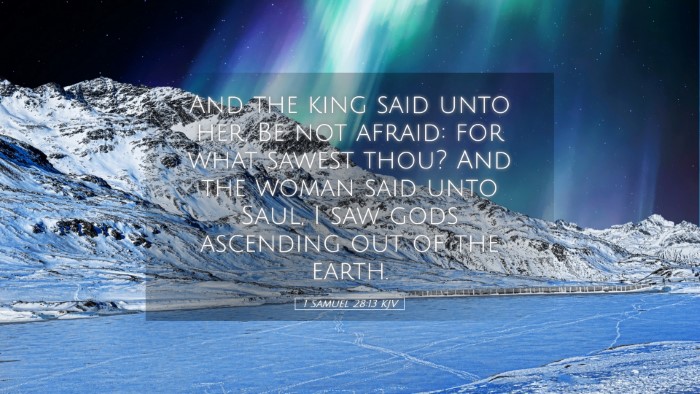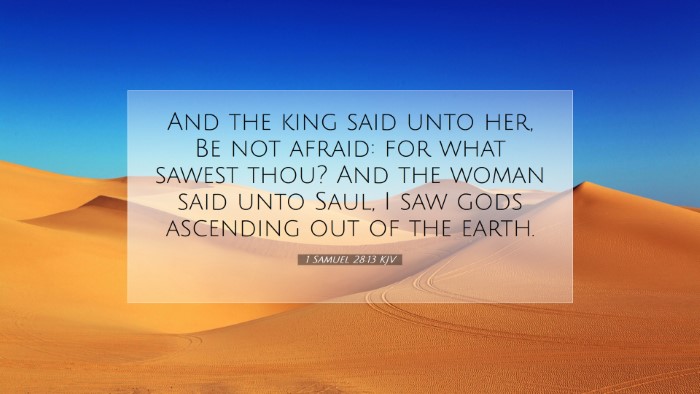Commentary on 1 Samuel 28:13
Bible Verse: "And the king said unto her, Be not afraid: for what sawest thou? And the woman said unto Saul, I saw gods ascending out of the earth."
Introduction
This verse is set in a remarkable narrative that illustrates the precarious state of King Saul. It unfolds during a time of deep spiritual darkness in Israel, reflecting the consequences of Saul's disobedience to God. In seeking counsel from a medium, Saul finds himself in an encounter that reveals his desperation and the profound spiritual conflict of the era.
Historical Context
At this time, Saul has been rejected by God as king due to his repeated disobedience and failure to follow divine commands. He is desperately seeking guidance as the Philistines gather for battle. In a moment of vulnerability and fear, Saul turns to a medium, a practice forbidden by the Law, indicating his spiritual decline.
Key Characters
- Saul: The anointed king who has lost God’s favor and is in a state of despair.
- The Medium: Known as the witch of Endor, she plays a crucial role in drawing forth a prophetic voice from beyond.
- Samuel: The deceased prophet, whose appearance marks a turning point in the narrative.
Analysis of 1 Samuel 28:13
Saul's Inquiry
Saul's question to the medium, "What sawest thou?" reveals his deep desire for reassurance in a time of uncertainty. This inquiry reflects his inner turmoil and lack of faith in God's ability to answer him. Instead of repenting or seeking God's guidance, he resorts to forbidden practices, illustrating the extent of his spiritual decline.
The Medium's Vision
The response of the medium, "I saw gods ascending out of the earth," opens a complex interpretation of her vision. This phrase might refer to supernatural beings or spirits, signaling an unusual occurrence in biblical narratives. According to Matthew Henry, the medium's admission points to the reality of the spiritual realm and indicates the gravity of Paul's situation, as it acknowledges the presence of divine authority over the events at hand.
Interpretation of 'gods'
Some commentators, including Albert Barnes, point out that the term "gods" may not necessarily imply polytheism. Instead, it conveys the idea of divine beings or spirits. This aligns closely with the biblical narrative where angels or the dead are often referred to in elevated terms. The woman's interpretation may also highlight the ambiguity surrounding the supernatural, emphasizing the blurring of lines between the divine and the diabolical in these final days of Saul.
Theological Implications
The encounter between Saul and the medium culminates in significant theological reflections. Adam Clarke posits that this moment serves as a powerful reminder of the dangers of seeking guidance outside of God's ordained means. Saul's action of consulting a medium is indicative of profound faithlessness and a turning away from God in the midst of spiritual crisis.
- Spiritual Desperation: The decline and fall of Saul highlight how fear can lead individuals away from God rather than towards Him.
- Consequences of Disobedience: Saul's choice emphasizes how persistent disobedience results in a loss of divine communication.
- Judgment and Accountability: Saul's actions serve as a reminder that one cannot escape accountability to God, even through illicit means.
Conclusion
1 Samuel 28:13 is a poignant reminder of the perils of moving away from dependence on God. The narrative illustrates Saul's tragic fall from grace and challenges readers to consider their responses in the face of adversity. As pastors, students, and scholars reflect upon this passage, it's crucial to engage with the complexities of spiritual truth and the consequences of God’s absence in one's life.
In summary, this verse encapsulates a critical moment in biblical history that resonates deeply with themes of faith, despair, and the human condition. Through the interplay of characters and the unfolding of Saul's decisions, we find significant lessons about the nature of God, human frailty, and the importance of remaining steadfast in faith, regardless of circumstances.


